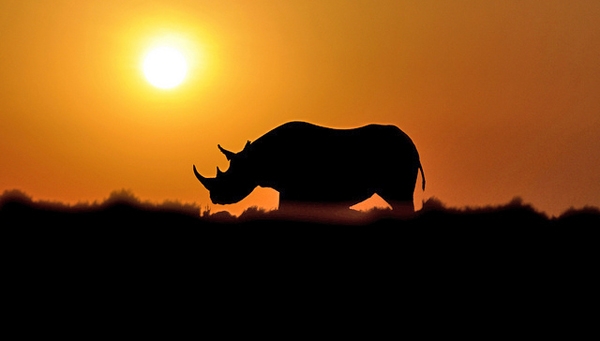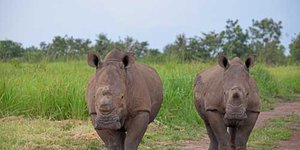Like this article?
Go on, give it a kudu!

Published on September 17 2013
Written by:
Fran
630 views
Africa's Tusk Conservation Awards recognize the individuals that are selflessly working towards conservation and community development, and specifically projects that are not holding back when it comes to managing conflict and highly threatened species. This year's prestigious Tusk Awards were awarded to Zimbabwean Clive Stockil and Kenyan Tom Lalampaa. The award ceremony was held at the Royal Society in London, attended by the Duke and Duchess of Cambridge.
Africa is a continent blessed with beauty and wonder, but it is also a continent plagued by conflict. Conflict between people and its wildlife, and often the battlefields are the communal land verges: that almost uncertain place where man and wildlife both struggle for survival. Yet every once in a while stories of hope conquer, stories too inspiring not to recognize or acknowledge. And this is what Africa’s Tusk Conservation Awards are all about: giving recognition to visionary and brave individuals that are rooted squarely in their communal lands, where their efforts are reaping great rewards for both man and wildlife.
Who is Tusk?
Established in the 1990s, the Tusk Trust was the initiative of Charlie Mayhew, who is still actively involved. During the recent years, the Duke of Cambridge lent some royal support (and glamor) to the organization and its events. This UK-based conservation charity organization is currently funded by Investec Asset Management amongst others. The annual Tusk awards fall into two categories: the Prince William Award for Lifetime Conservation Achievement, honoring seasoned conservationists who have made considerable progress towards conservation in Africa, and the Tusk Award for Conservation in Africa, honoring the rising stars of Africa’s conservation field. Apart from the annual awards, Tusk supports over 50 African conservation initiatives in 18 African countries. At a prestigious event last week, Prince William announced this year’s award winners and handed them considerable sums of funding, to be applied to their respective conservation projects. The stories behind this year’s award winners are inspirational and encouraging, and above all, it offers time and public support for some of Africa’s most pressing wildlife concerns.
Lifetime Achievement Award
Clive Stockil, a conservation giant, was awarded the prestigious 2013 Lifetime Achievement Award - an award that does not go unnoticed in the international conservation arena! Prince William commemorated Stockil’s work with rhino conservation and protection against poaching. This Zimbabwean has long recognized one of Africa’s greatest challenges, namely human needs and pressure, and designed conservation initiatives around these challenges. The outcome was an incredible change for the Mahenye people. In managing the ever aloof situation of balancing community development while achieving conservation goals, Stockil established the Save Valley Conservancy as well as the CAMPFIRE (Communal Areas Management Programme for Indigenous Resources) initiative. Stockil’s initiatives ultimately serve both the local community and its wildlife. With conservation initiatives up and running, a school and tourist lodge offering education and local employment, Stockil has his mind set on now establishing a wilderness reserve on communal land. With everything that Stockil has already achieved for rhino, nature and conservation protection coupled with community development and the nurturing of an environmental appreciation among local communities, we can be sure to see the establishment of this wilderness reserve in the near future!
Conservation Award
A young Kenyan boy with the name of Tom Lalampaa was sent from his family’s Westgate pastoral environment to boarding school, an opportunity that was actually reserved for his older brother as the family’s firstborn son. It turned out that the school fees paid by the local community was one of its greatest investments. Today, after successfully completing numerous degrees, Tom is the chief conservation officer of Kenya’s Northern Rangeland Trust. But it is not the position or postgraduate degrees that impress, but rather the way in which Tom is achieving his vision for marginalized communities to co-exist in harmony with Kenya’s precious wildlife. Although this vision is troubled by conflict at times, Tom is quick to remind that it is all about peace, peace between communities and peace between communities and its wildlife. International conservationists have said that Tom is fuelling a tsunami that is changing mindsets in Africa’s plains. Tom is living inspiration that conservation regions can be established, run, managed, and planned by communities, and for communities. Now dubbed as Westgate’s firstborn son, Tom is helping marginalized communities improve their own livelihoods, while giving wildlife a fair chance at surviving Africa’s harshness.
Special prize
The marine biology conservation work of Dr. Alasdair Harris was also recognized and Prince William awarded a special prize to honor Dr. Harris’ work along Madagascar’s coast. Not only has Dr. Harris achieved significant marine biodiversity conservation goals, but he was also applauded for the way in which his conservation initiatives are protecting traditional coastal livelihoods.
An added focus to this year’s royal award evening was Prince William’s speech which pointed out the threats of rhino poaching. Talking about the real threat that his son Prince George, may very well grow up in a world without rhinos in the wild, Prince William spoke out against rhino and elephant poaching. The individuals recognized for their conservation efforts by the Tusk Awards are truly Africa’s lifeline to see the protection of its most vulnerable: the rhino, elephant, its stampeded soils and its communities in need. And with the Tusk Trust’s philosophy of linking Africa’s wildlife and its communities, creating a mutually beneficial heritage for both, one cannot otherwise but believe that these are the stories that will keep Africa alive.
Photo credits: some rights reserved by RayMorris1 via flickr [Creative Commons]
Has been on: 11 safaris
Seeing beyond the average tourist routes and experiencing local life is my type of travel! Living in South Africa I'm an environmentalist at heart, and I continue to marvel at the beauty of the African continent.
© Your African Safari Ltd, All rights reserved.
Your African Safari is a safari-planning and safari review site. It was created to help support a healthy African wildlife population. All reviews are vetted before being approved and only ethical tours are published

Garamba National Park—an anchor of hope in the Democratic Republic of Congo
Published on January 09 2025
By: R.W.

Namibia imposes new visa requirements
Published on July 25 2024
By: yourafricansafari.com

Do I really need travel insurance or travel protection for my safari?
Published on July 30 2024
By: yourafricansafari.com